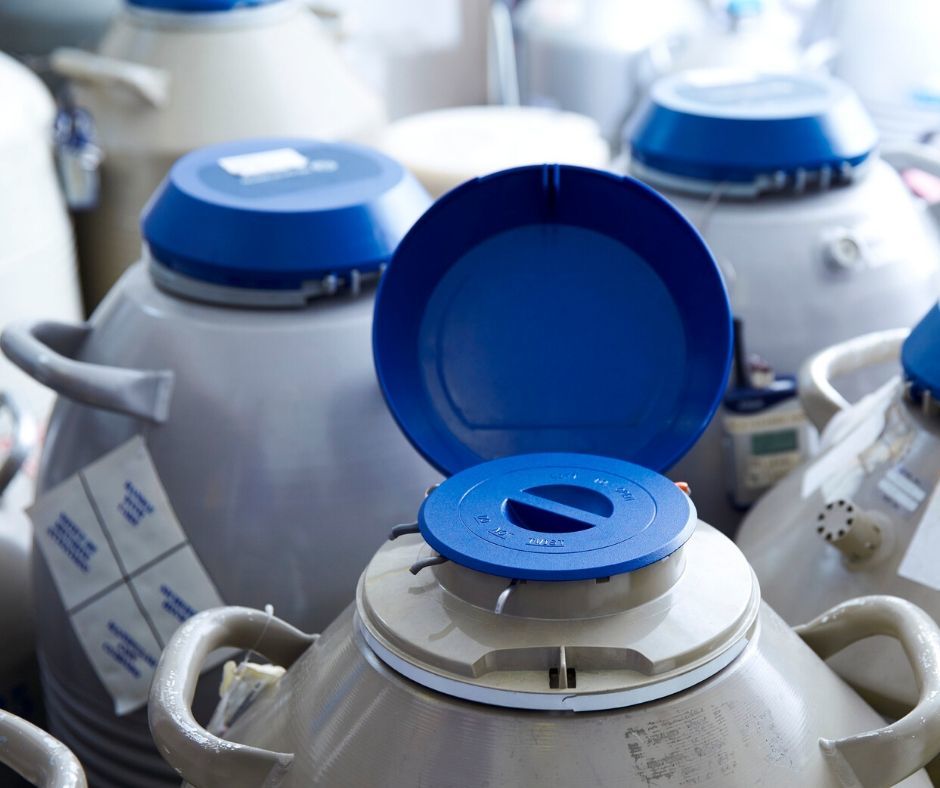Are you interested in fertility treatments? Then you also want to know about sperm preservation. And then you suddenly find yourself in the middle of a sea of foreign words and technical terms. They are everywhere. There's talk of pre-implantation diagnostics and kyropreservation. Who would know anything about that? And what is advanced sperm vitrification?
Why are sperm frozen?
There are several reasons why a man may want to preserve his sperm. With some conditions, it is clear that the man will have fewer and fewer fertile sperm. Therapies such as chemotherapy or radiotherapy for cancer can mean that the man no longer has fertile sperm. There are also surgeries that can make a man infertile. In this case, it can be very useful to preserve a sample of sperm (an ejaculate). Especially if the man is still young and may want to have children.
If a man has to be away for a long period of time, it can also be useful to store sperm. Men who donate sperm also have their sperm preserved.
In some cases, fertility treatment involves stimulating sperm production. This means that the man takes medication to help him produce more healthy sperm. If there are any sperm left over, they can be preserved. Then the man does not need to take any medication the next time.
In all these cases, the sperm are preserved by cold - in principle, they are frozen.
When is the frozen sperm needed?
Sperm is needed for all forms of assisted reproduction. This applies to both insemination and in vitro fertilisation. There are several reasons why fresh sperm may not be used.
Either the patient wants to use sperm from a donor, or there are no or not enough sperm available from her partner at the time. In either case, it is important that the frozen sperm is of high quality.
What happens during freezing?
Everyone knows what freezing is: you cool something to minus degrees in order to preserve it. This is what happens in the freezer, for example. Industrial or medical methods use much lower temperatures.
The low temperatures stop all metabolic processes. The cells go into a kind of dormant state. This makes the frozen food last longer.
This method also works with sperm or egg cells, for example. If all goes well, they are fertile and ready to be used again after thawing. But there is a problem.

The problem with water when it freezes
Water crystallises when it becomes solid due to cold. It forms crystals, like snow. If you freeze water, you get a big block of ice. So substances that contain a lot of water form ice crystals when they freeze. You can see this in vegetables, for example, when they are frozen wet. You can see these white crystals on the surface.
If there is a lot of water in the material itself, the water will crystallise in the material. Ice takes up more space than water - it has a greater volume. So in this case, the individual cells burst. Have you ever frozen apple slices? When you defrost them, they are mushy because the cells have burst.
The lower the freezing temperature, the faster the material freezes. The water has less time to crystallise and the crystals are smaller. That's why store-bought frozen vegetables have fewer ice crystals than your own. The freezing companies use lower temperatures than your freezer.
What is sperm cryopreservation?
If sperm are to be cryopreserved, i.e. made permanent, it is important that as many as possible are preserved. For this reason, sperm are usually frozen in liquid nitrogen at -196 degrees. This is called cryopreservation. At these temperatures, sperm can be preserved for decades.
What is advanced vitrification?
Vitrification is a process that allows very fast freezing. The frozen food is mixed with a freezing medium and then frozen. This only takes a few seconds. This process is relatively new and is therefore sometimes called 'advanced vitrification'. This process has been used for some time for eggs and embryos, because eggs and embryos are particularly sensitive to the formation of ice crystals.
What is advanced sperm vitrification?
If sperm samples are to be frozen, it is of course just as convenient to use Advanced Vitrification. This involves mixing the sperm sample with a freezing medium. It is then frozen in liquid nitrogen at -196 degrees. This process takes a very short time, just a few seconds. This means that more sperm remain viable than with any other freezing method currently known. In a suitable storage facility, the sperm can be stored without significant loss of fertility until needed.
How does advanced sperm vitrification work?
For advanced sperm vitrification, the donor must first provide ejaculate. This is usually tested using a spermiogram. This tests the proportion of reproductive sperm. If there are sperm suitable for artificial insemination, the ejaculate is mixed with a freezing medium and frozen at a rate of -10000 degrees per minute. After a period of time in a quarantine tank, the frozen sperm is stored at - 196 degrees. Usually a contract is signed with the sperm bank, a kind of lease. This contract has a minimum term and can be extended.
If the sperm is needed, for example for IVF, you can collect the sperm yourself or you can give someone power of attorney to collect the sperm.

«Vitrification keeps sperm more fertile than any other freezing method currently available.»
So what are the benefits of advanced sperm vitrification?
If you want to have children and it is not as easy as it is for other women, you need professional help. You need to go to therapy, which is time consuming and expensive. Of course, you want to have the best possible chance of success. It doesn't matter whether it's IVF or another type of treatment.
In the end, whether you will be able to have a baby depends on several factors. One of these is the quality of the sperm.
If fresh sperm cannot be used, frozen sperm is used. Frozen sperm is of better quality if it has been vitrified rather than frozen.
